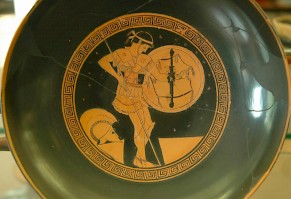Aigospotamoi (1)
Q866862Aigospotamoi: the final battle of the Peloponnesian War (431-404). In September 405, the Athenians were decisively defeated by the Spartans and lost their navy. As a result, the siege and fall of Athens became inevitable.
The Battle of Aigospotamoi (405 BCE)

The battle of Aigospotamoi, or - to use its Latin name - Aegospotami, was the last great confrontation between Athens and her allies on the one hand, and Sparta and her allies on the other hand. Unfortunately, our two principal sources, Xenophon and Diodorus of Sicily, appear to contradict each other, and the aim of this article is therefore to present a coherent reconstruction of what really happened.
Besides the two primary sources, Xenophon's Hellenica 2.1.17-32 and Diodorus' Library, 13.104.8-106.8, several other sources refer to Aigospotamoi. Among them are: Plutarch (Life of Lysander, 10-11) Frontinus, (Stratagems, 2.1.18), Polyaenus (Stratagems, 1.45.2), and Pausanias (Description of Greece, 9.32.9). These authors are assumed to be based on Xenophon. Plutarch (Life of Alcibiades, 36-37) and Nepos (Alcibiades, 8) also follow Xenophon's story, but they also contain details that remind one of Diodorus. Although they appear to be secondary, these descriptions are still useful for verifying certain physical aspects like the location of the battlefield.
Because modern authors have chosen to follow either Xenophon or Diodorus, the two different interpretations of the battle of Aigospotamoi have continued to coexist.note When occasionally both Xenophon and Diodorus are quoted, there is almost never an attempt to reconcile the two.
Traditionally, Xenophon's version of Aigospotamoi is considered to be the more complete of the two. His pre-eminence can be ascribed, for one part, to his apparently objective writing. However, this started to change in the seventies. Studies of the orations by Lysias and the Oxyrhynchus Hellenica suggested historians that Diodorus' description is not without merit. Nowadays this revisionist movement, led by Ehrhardt, is the dominant one, although the matter is by no means settled.
I have divided my paper into four parts.
- In part one I will describe the preliminaries of the Aigospotamoi campaign.
- In part two I will give a sketch of the conditions. In my opinion this is necessary to comprehend the battle. I will also examine the strengths and weaknesses of both armies, and I hope that the insight gained will contribute to an appreciation of the significance of the last battle of the Peloponnesian War.
- In part three, I will attempt to describe the actual confrontation by elaborating on the modern day historian's discussion on the battle of Aigospotamoi, and where possible, of course, emphasize my preference.
- Finally, in part four I will reflect on the Aigospotamoi campaign in general.